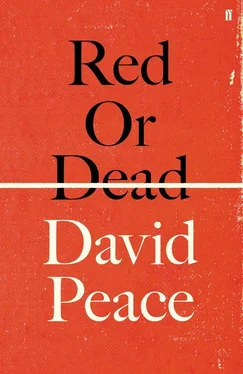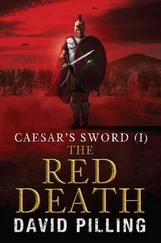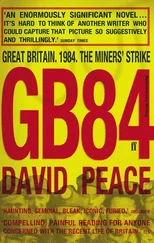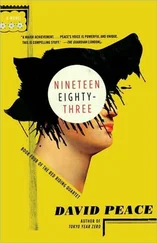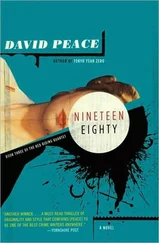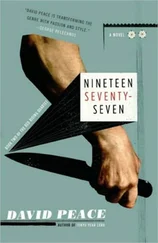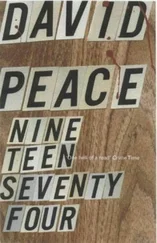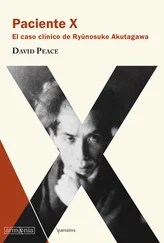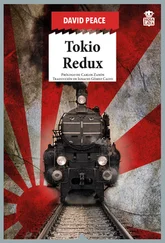at Anfield.
…
After the whistles, all of the whistles. Along the corridor, into the dressing room. Bill slammed the door, Bill locked the door. Bill turned to face the players of Liverpool Football Club. The tops of their heads, the fall of their shoulders. Their necks and their backs. And Bill said, Look up. Look up at me! Into my face and into my eyes. Look up at me now. You parcel of rogues! You pack of scoundrels! You’re a disgrace. Every single one of you. A disgrace and a menace. A disgrace to this club and a menace to our supporters. Stealing their money and killing their dreams. A parcel of thieves, a pack of murderers. That’s what you are. Thieves and murderers. And you should be in prison. Every one of you, every single one of you. In prison. That’s where you belong. Because I saw men crying today. Grown men crying on the Kop, crying today because of you. And I cannot blame them, I do not blame them. Spending their money, their hard-earned money. To watch you, watching you play like that. Losing like that, four — nil. Four — nil at home, at home to Everton. Everton of all teams. Everton! I’d be crying, too. If I wasn’t so angry, if I wasn’t so furious. I tell you, if you ever play for Liverpool Football Club again, the next game you play, you better win five — nil. Five — nil! And the next time they come here, the next time Everton Football Club come here, here to Anfield, you better beat them five — nil, too. Five — nil! Or you will never play for Liverpool Football Club again. I tell you that now. Not one of you. Never again. If you ever play like that again. Now get out, get out! Every one of you, every single one of you. Because I cannot look at you, I cannot look at you any more. Because I’m ashamed of you. I am ashamed to be your manager. And I never thought, never thought in my worst nightmares, never thought I’d ever feel that, never thought I’d ever say that. So get out, get out now! While there are still some folk about. Folk who supported you, the folk who paid your wages today. Get out there now, walk among them now. And let them tell you what they think of you, what they think of Liverpool Football Club losing four — nil at home, at Anfield, to Everton. Because I tell you, what I’ve said will be nothing compared to what they say. Nothing. So get up, get out! Get up and get out there now. And walk among those people. And listen to those people. Listen to their words and remember their words. And remember those people.
17. A RED GLOW IN THE SKY
On the morning of Sunday 20 September, 1964, Liverpool Football Club were twenty-first in the First Division. The Champions of England second from the bottom of the table. Under the stands, among the boots. The dirty boots, the hanging boots. Bill Shankly, Bob Paisley, Reuben Bennett, Joe Fagan and Albert Shelley knew this was going to be a long season. The longest season in the history of Liverpool Football Club. A long and tiring season. Bill Shankly, Bob Paisley, Reuben Bennett, Joe Fagan and Albert Shelley knew their preparations for this season, this long and tiring season, had not been ideal, had not been what they wanted. The players of Liverpool Football Club had returned from their tour of the United States exhausted. Many of the players of Liverpool Football Club had now won the recognition of their countries. Many of the players of Liverpool Football Club were now in their national teams. Selected and capped. Playing more games, many more games. Training with different managers, listening to different voices. Being distracted, getting exhausted. Exhausted and injured. Injured and finished. Under the stands, among the boots. The dirty boots, the hanging boots. Bill Shankly, Bob Paisley, Reuben Bennett, Joe Fagan and Albert Shelley knew some players would have to step down, down to the reserves. Players like Alan A’Court and Ronnie Moran. That some players would not want to step down, that some players would want a transfer. Players like Alan A’Court. Under the stands, among the boots. The dirty boots, the hanging boots. Bill Shankly, Bob Paisley, Reuben Bennett, Joe Fagan and Albert Shelley knew some players would have to step up, up from the reserves. They knew some players would be able to step up, up to the first team. Players like Bobby Graham, Chris Lawler, Tommy Smith and Gordon Wallace. They knew other players would struggle, struggle to step up. Players like Philip Ferns, Alan Hignett, Thomas Lowry, Willie Molyneux and John Sealey. Under the stands, among the boots. The dirty boots, the hanging boots. Bill Shankly, Bob Paisley, Reuben Bennett, Joe Fagan and Albert Shelley knew they would need still more players, need to bring in still more players. Players like Phil Chisnall. From Manchester United. Players like Geoff Strong. From Arsenal. Under the stands, among the boots. The dirty boots, the hanging boots. Bill Shankly, Bob Paisley, Reuben Bennett, Joe Fagan and Albert Shelley knew there would have to be these changes, have to be these experiments. That these changes, that these experiments, would make consistency difficult, would make stability elusive. That there would be ups and there would be downs. Before consistency, before stability. In a long season, the longest season in the history of Liverpool Football Club. Bill Shankly, Bob Paisley, Reuben Bennett, Joe Fagan and Albert Shelley knew there would be ups and downs. Many more ups
and downs, ups and
downs.
…
On Saturday 26 September, 1964, one week after Everton Football Club had come to Anfield, Liverpool. One week after Everton Football Club had beaten Liverpool Football Club four — nil at Anfield, Liverpool. Aston Villa Football Club came to Anfield, Liverpool. That afternoon, thirty-eight thousand, nine hundred and forty folk came, too. In the sixth minute, Bobby Graham scored. In the thirty-sixth minute, Ian Callaghan scored. In the fifty-sixth minute, Roger Hunt scored. In the sixty-fourth minute, Graham scored again. And in the eighty-sixth minute, Graham scored again. And Liverpool Football Club beat Aston Villa five — one. At home, at Anfield. On Wednesday 7 October, 1964, Sheffield United came to Anfield, Liverpool. That evening, thirty-seven thousand, seven hundred and forty-five folk came, too. In the thirty-first minute, Roger Hunt scored. In the fifty-third minute, Hunt scored again. And in the fifty-ninth minute, Bobby Graham scored. And Liverpool Football Club beat Sheffield United three — one. At home, at Anfield. Three days after that, Liverpool Football Club travelled to St Andrews, Birmingham. And Liverpool Football Club drew nil — nil with Birmingham City. Three days later, Leicester City Football Club came to Anfield, Liverpool. That evening, forty-two thousand, five hundred and fifty-eight folk came, too. That evening, Liverpool Football Club lost one — nil to Leicester City. Again.
Four days later, West Ham United came to Anfield, Liverpool. That afternoon, thirty-six thousand and twenty-nine folk came, too. In the seventh minute, Ian St John scored. In the twenty-seventh minute, Roger Hunt scored. But that afternoon, Liverpool Football Club drew two-all with West Ham United. One week later, Liverpool Football Club travelled to the Hawthorns, Birmingham. And Liverpool Football Club lost three — nil to West Bromwich Albion.
On Saturday 31 October, 1964, Manchester United came to Anfield, Liverpool. That afternoon, fifty-two thousand, four hundred and two folk came, too. But Liverpool Football Club lost two — nil to Manchester United. At home, at Anfield. That evening, Manchester United were top of the First Division. That evening, Liverpool Football Club were eighteenth in the First Division. That evening, under the stands, among the boots. The dirty boots and the hanging boots. Bill Shankly, Bob Paisley, Reuben Bennett, Joe Fagan and Albert Shelley knew this was a long, hard season. The longest and the hardest season in the history of Liverpool Football Club. A season of ups and downs. Home and away, ups
Читать дальше
